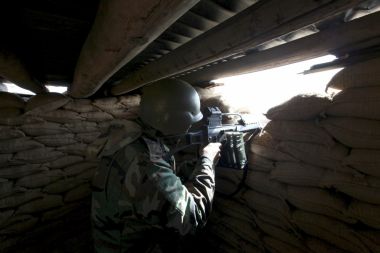Islamic State open market to sell goods stolen from Christians in Mosul

Islamic State militants in Mosul have opened a special market for selling goods looted from Christian houses in the city, according to the Ankawa news service.
The market is also selling material taken from churches in the area.
Islamic State has given the market the title "Spoils of Nasara (Christians)".
Among the goods for sale are TVs, refrigerators, freezers, cooling systems and electrical devices stolen from Christian homes. Ankawa's source said that the material was attractive to local people as it was of good quality and cheap.
Church from the Syriac, Catholics, Armenians and Chaldean communities have been looted and their contents put up for sale.
Mosul's Christians were forced out when Islamic State captured it last June amid scenes of great brutality. It has since been attacked by Kurdish Peshmerga forces who have fired rockets into the city in an attempt to hit a gathering of militants. US airstrikes regularly hit targets outside the city itself.
The United States and Iraq have started preparing for an offensive by summer to recapture Mosul. Preparations include selecting and training military units for the planned assault and cutting supply lines to Islamic State fighters.
At a conference on Saturday in Baghdad, the Patriarch of the Chaldean Church, Mar Raphael I Louis Sako, called for the "culture" of Islamic State to be combatted, saying: "Condemnation alone is not enough. Let us start the treatment by drying up the [financial] sources of extremism and terrorism, by blocking this terrifying culture and its theoreticians and promoters, and by creating a new, open, and positive culture that respects diversity and difference."
The conference, which focused on inter-faith harmony, included contributions from Iraq's president, Fouad Massoum, and prime minister, Haider al-Abadi, who attended the event with other high-profile parliamentarians and religious leaders.











